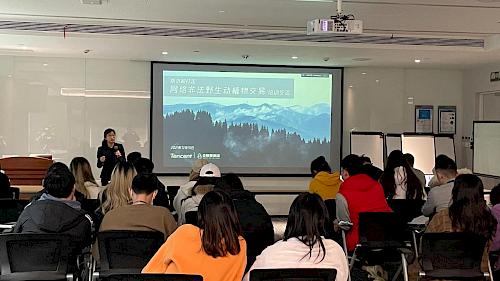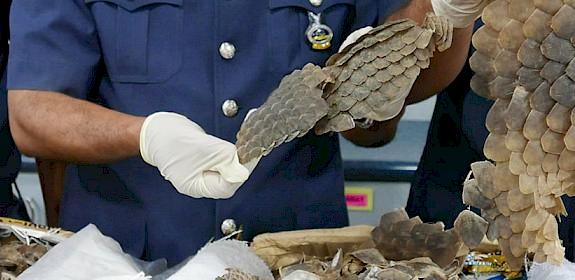‘Follow The Money’ To Uncover Online Criminal Wildlife Trade Networks says TRAFFIC China
Chengdu, China, December 2021 - Chinese online platforms should consider implementing anti-money laundering (AML) ‘follow the money’ approaches to prevent traffickers from exploiting their services for illegal wildlife trade and help catch the wider criminal networks negatively impacting species and ecosystems across the globe.
TRAFFIC’s long-term online market monitoring has shown criminals to take advantage of Chinese online platform payment services to sell illegally obtained wildlife products domestically and internationally. However, if fostered by Chinese banks and online platforms, AML strategies can play a crucial, game-changing role by increasing the risks of wildlife trafficking and identifying the wider criminal networks.
We are glad to see that Tencent has started to pay close attention to the use of AML approach in fighting against wildlife crime, but the overall awareness and skills applied in China’s financial sectors still need to be further raised and improved. In China, investigations and prosecutions still rely primarily on charges for poaching or trafficking. At the same time, financial crimes are mostly overlooked and not fully utilised as a tool to identify and bring those who profit most from wildlife crime to justice.”
TRAFFIC AML Project Manager Linda Chou
Chou continued: “To address these issues, TRAFFIC is developing guidelines on AML implementation for enforcement and judicial authorities, a Training of Trainer (TOT) Module for financial institutions and third-party payment platforms will be developed in collaboration with Association of Certified Anti-Money Laundering Specialists (ACAMS).”
Setting the example for online industries, Tencent recognised its mobile payment service, WeChat pay, might be used by criminals to launder the proceeds of the illegal wildlife trade, so it teamed up with TRAFFIC and Guangdong Forest Police Bureau to improve the AML team’s capacity in combating illicit trade of wildlife.

At a recent training session in Tencent Chengdu Office, TRAFFIC emphasised relevant laws and regulations, methods of payments or criminal transactions used in wildlife and forest crime, and identification skills for species commonly traded online to Tencent’s Anti-money Laundering team and customer service staff responsible for handling illicit trade wildlife reports.
Forest police from Guangdong Province shared the challenges of cracking down on illegal wildlife trade online and implementing “follow the money” in wildlife crime investigation. Police also gave suggestions on further strengthening collaboration between law enforcement and Tencent to detect IWT on WeChat and monitor suspicious transactions related to IWT.
“This is the very first-time Chinese law enforcement authority exchanged views with the private sector on combating IWT through AML approach and is a very positive step in the right direction. TRAFFIC continues to provide the platform for cooperation and communication between the Chinese private sector, financial industry and law enforcement agencies to combat wildlife crime networks, and in turn, support global biodiversity conservation,” said Director of TRAFFIC China, Ling XU.
The AML team would like to expand their work to all environmental crime and wish to form external collaboration to improve the information/resource exchange and team capacity in combating wildlife and forest crime.
Notes:
TRAFFIC China office’s AML projects were kindly supported by the Bureau of International Narcotics and Law Enforcement Affairs (INL), the U.S. Department of State and Norway’s International Climate and Forest Initiative (NICFI).
 About INL:
About INL:
The mission of INL is to minimise the impact of international crime, such as money laundering and criminal gangs, and illegal drugs on the United States, its citizens, and partner nations by providing practical foreign assistance and fostering global cooperation.
 About NICFI:
About NICFI:
NICFI supports efforts to reduce greenhouse gas emissions resulting from deforestation and forest degradation in developing countries through efforts to improve forest and land management in tropical forest countries and reduce the pressure on tropical forests from global markets.
About Tencent:
Tencent is a world-leading internet and technology company that developed the multi-purpose mobile app WeChat, providing private instant messaging, social media (WeChat moment) and mobile payment services. First released in 2011, by 2021 WeChat, had 1.26 billion monthly active users in China and abroad.
Tencent for the Planet
As one of the founding members of the Coalition to End Wildlife Trafficking Online, Tencent, home of the mobile app WeChat, has actively addressed wildlife cybercrime by launching “Tencent for the Planet” and encouraging users to report information on illegal wildlife trade on the WeChat platform.
In 2019, Tencent received nearly 10,000 reports about illegal wildlife trade from WeChat users. A total of 2,000 WeChat accounts with prohibited wildlife products for sale were warned or shut down. With Tencent’s support, law enforcement uncovered and dismantled a criminal network arrested 129 suspects, and seized 216 live pangolins, 66kg of pangolin scales, 20 Tibetan antelope horns and a batch of other wildlife products, alongside the confiscation of over 18 million Chinese yuan transaction funds in 2018. Read more




